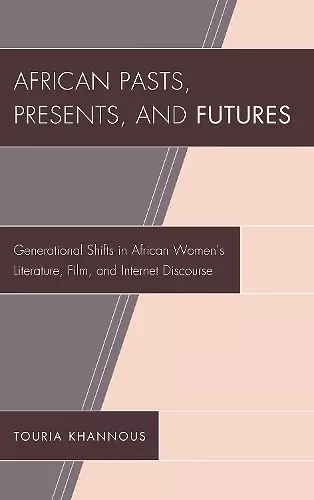African Pasts, Presents, and Futures
Generational Shifts in African Women's Literature, Film, and Internet Discourse
Format:Hardback
Publisher:Lexington Books
Published:17th Oct '13
Currently unavailable, and unfortunately no date known when it will be back

African Pasts, Presents, and Futures: Generational Shifts in African Women's Literature, Film, and Internet Discourse, by Touria Khannous, provides a history of African women’s cultural production, as well as an alternative approach to the arguments that have traditionally dominated post-colonial studies in general, and African and gender studies in particular. It examines some of the more overarching questions that are prevalent in the works of African women authors, who position themselves within the contexts of Islam, feminism, nationalism, modernity, and global and postcolonial politics, thus engaging in the construction of socio-political platforms for reform in their home countries. The book explores different aspects of women’s agency at the political, cultural, social, religious and aesthetic level, and highlights their civil society activism and push for legal reform. It also traces their opinions on a range of social and political questions and underscores fundamental shifts in their positions and concerns through the different generations.
Khannous provides insightful historical and political contextualization that makes the book accessible to a wide audience. Her contribution is timely and significant as it builds an important framework for further work on African women. * Research in African Literatures *
In this remarkable study, Touria Khannous brings together the work of African women from different generations and various locations in order to shed light on the ways in which they have challenged social and political situations in their countries through written and cinematic creations. This wide-ranging and well-organized book provides unprecedented insight into African women’s literary and cultural creativity in evolving postcolonial contexts, focusing especially on questions of gender and religious identity. It is especially noteworthy for its analysis of recent expressions by African women over the Internet, especially during the Arab Spring. -- Alison Rice, University of Notre Dame
Khannnous analyzes in fabulous critical detail the varied texts of her selected group of African women writers writ large, ranging from novelists to filmmakers to electronic social media producers from northern as well as sub-Saharan Africa and the diaspora, to demonstrate these women’s shared preoccupations with social change, social justice, and equality whatever their medium and wherever their locale. Khannous adroitly couples vivid textual analysis with astute historical and political contextualization that renders the texts and producers clearly significant to the field of women’s writing. Particularly cogent is her wide theoretical background, and the inclusion of social media activists to broaden the traditional notion of ‘writer.’ -- Sandra Carter, University of Houston
Touria Khannous’s book analyzes the spectrum of the feminine voices in Africa while displacing the boundaries of feminist theory—a real tour de force in the current debate about the ‘invention of Africa,’ viewed this time from the female perspective. It is a brilliant, uncompromising reading that achieves a vast geographical sweep and combines massive erudition with deft alertness to paradox, slippage, and nuance. -- Mustapha Marrouchi, University of Nevada, Las Vegas
Dr. Khannous cogently analyzes a half century of courageous feminist productions encompassing novel, theater, memoir, cinema and internet discourse. She highlights the specificities of African women’s experience under colonialism, postcolonialism and Islam. This rare study brings together important works from seven countries in the northern, western and southern regions of the continent and whose original languages include English, French and Arabic. Its compelling presentation of the political contexts responsible for violence and trauma makes this book useful for students and scholars from a wide variety of fields. -- Mary Vogl, Colorado State University
ISBN: 9780739170410
Dimensions: 236mm x 157mm x 22mm
Weight: 463g
230 pages